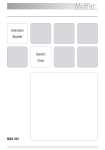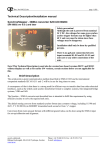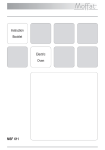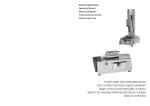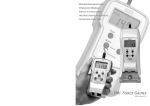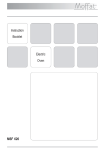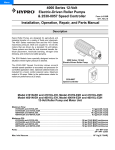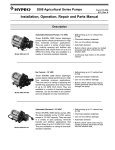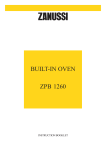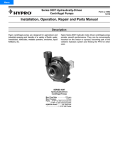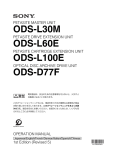Download Installation, Operation, Repair and Parts Manual
Transcript
® HYPRO Self-Priming Cast Iron Centrifugal Pumps Installation, Operation, Repair and Parts Manual Form L-1510 Rev. C Description Hypro Self-Priming Cast Iron Centrifugal Pumps handle big, high-capacity, liquid transfer jobs with ease. Use them for transferring water, liquid fertilizers, and other chemicals compatible with pump materials. Make short work of other 2" Model 1532C-6SP Pump with 6.5 hp PowerPro gas engine 1532C-160HSP Pump with Honda GX160 gas engine 3430-0673CSP Pump only for 3/4" shaft gas engine mount 9232C-SP Pump with pedestal 9732C-SPX Pump with 184TC NEMA flange Max Flow Rate: . . . . . . . . . . . . . . . . . . . . . . . . . . .170 GPM Max. Pressure: . . . . . . . . . . . . . . . . . . . . . . . . . . . . . 42 PSI Max. Total Head: . . . . . . . . . . . . . . . . . . . . . . . . . . . . .97 ft. Ports: . . . . . . . . . . . . . . . . . . . . . . . . . . . . . . . . .2" NPT Inlet 2" NPT Outlet Engine: . . . . . . . . . . . . .PowerPro 6.5 HP or Honda GX160 farm jobs: filling nurse tanks, watering seedbeds, and transferring liquids. This self-priming model makes it ideal for de-watering applications. 3" Model 1533C-13SP Pump with 13 hp PowerPro gas engine 1533C-13ESP Pump with 13 hp electric start PowerPro gas engine 1533C-390EHSP Pump with Honda GX390 gas engine 3430-0674CSP Pump only for 1" shaft gas engine mount 9233C-SP Pump with pedestal 9733C-SPX Pump with 215TC NEMA flange Max Flow Rate: . . . . . . . . . . . . . . . . . . . . . . . . . .330 GPM Max. Pressure: . . . . . . . . . . . . . . . . . . . . . . . . . . . . 60 PSI Max. Total Head: . . . . . . . . . . . . . . . . . . . . . . . . . . . .140 ft. Ports: . . . . . . . . . . . . . . . . . . . . . . . . . . . . . . . .3" NPT Inlet 3" NPT Outlet Engine: . . . . . .PowerPro 9.0 or 13.0 HP or Honda GX390 Note: Unit is not shipped with oil. Please add oil to engine prior to operating. California Proposition 65 Warning -- This product and related accessories contain chemicals known to the State of California to cause cancer, birth defects or other reproductive harm. General Safety Information WARNING: Do not pump flammable or explosive fluids such as Gasoline, Fuel Oil, Kerosene, etc. Do not use in explosive atmospheres. The pump should be used only with liquids that are compatible with the pump component materials. Failure to follow this Warning can result in Personal Injury and/or Property Damage and Will Void the Product Warranty. 5. Periodically inspect the pump and the system components. Perform routine maintenance as required (see Maintenance section). 6. Protect pump from freezing conditions by draining liquid and pumping a permanent-type automobile antifreeze containing a rust inhibitor through the system, coating the pump interior. A 50% mixture with water is recommended. 1. DO NOT EXCEED recommended speed, pressure and temperature (120 degrees F) for pump and equipment being used. 7. Do not operate a gasoline engine in an enclosed area. Be sure the area is well ventilated. WARNING: Gasoline is a highly combustible fuel. The improper use, handling, or storage of Gasoline can be dangerous. Never touch or fill a hot engine. 2. BEFORE SERVICING, drain all liquids from the system and flush. Remove the spark plug wire from the spark plug before servicing the pump or engine. 8. Use only pipe, hose and fittings rated for the maximum psi rating of the pump. 3. Secure the discharge lines before starting the pump. An unsecured line may whip, causing personal injury and/or property damage. 9. Do not use these pumps for pumping water or other liquids for human or animal consumption. 4. Check hose for weak or worn condition before each use. Make certain that all connections are tight and secure. Plumbing Installation IMPORTANT NOTICE: Settling and/or shifting during operation can cause piping to place excessive strain on the pump and may damage pump case. Set pump on hard level surface. Non-level surfaces may cause the oil sensor in the engine to shut down the unit. For best possible performance and continuous, satisfactory operation, read these instructions before installing your new pump. Should service be required, this manual can be a valuable guide. It should be kept near the installation for ready reference. Preliminary to Mounting Before setting up the pump for operation, check to see that the motor and pump turn freely by hand. If it cannot be turned over by pulling on the recoil starter, open casing to check for obstructions lodged in pump. Basket Strainer A basket strainer is to be used when transferring solutions that may contain debris and solids which could become lodged in the pump or damage the impeller. Because of the high flow capacity of this pump, unknown debris could be siphoned off the bottom of the tank. Install the strainer on the suction side of the pump whenever possible to avoid pump damage. INSTALLATION SUCTION CONNECTION Connect either rigid pipe or flexible suction hose to pump suction. If hose is selected, hose must be rated to hold the suction vacuum and prevent collapse while the pump is running. Make the suction line a continuous rise from the water source to the pump. High spots can trap air and also make priming difficult. Make sure all connections are tight and free of air leaks. NOTICE: Suction pipe or hose must be at least as large as the pump suction inlet in order for the pump to operate properly. If the inlet line is longer than approximately 6 feet, use the next size larger line. Minimum depth for the suction inlet is determined by the diameter of the suction line. LOCATION DISCHARGE CONNECTIONS Place unit as close to water source as possible to minimize suction lift, obtain the best pumping performance, and aid in priming. For permanent installation, mount unit on a foundation that will support the weight of the pump and engine and also provide stability while the pump is running. For most permanent installations, it is advisable to bolt unit directly to foundation. Your pump is equipped with a single port discharge. Select the appropriate size for the application. Install a “T” to allow easy priming of the pump without disconnecting the piping, or by using the priming plug on the housing. Hazardous Suction Always use strainer on suction hose to prevent entrapment. Can trap persons against suction inlet. Warning 2 Hazardous Substance Alert Please Note: It is illegal to ship or transport any hazardous chemicals without United States Environmental Protection Agency Licensing. 2. Before returning unit for repair, drain out all liquids and flush unit with neutralizing liquid. Then, drain the pump. Attach a tag or include a written notice certifying that this has been done. 3. Never store pumps containing hazardous chemicals. 1. Always drain and flush pumps before servicing or disassembling for any reason. Operation and Maintenance Preparations Before Starting the Engine 4. Operation of choke lever. When engine is cold: In cold weather, start engine with choke in fully closed position. 1. Engines come from factory without oil. Please fill with oil prior to starting! 2. Fuel: Check fuel level in tank, and do not over fill. Use fresh, clean automotive fuel. Note: DO NOT FILL FUEL TANK WHEN ENGINE IS RUNNING. In warm weather, start engine with choke in halfclosed position. When engine is warm: Start engine with choke in fully open position. 5. Start engine by pulling recoil starter out quickly and forcefully. Repeat pulling until the engine starts. 3. Engine Oil: Before checking or refilling with engine oil, make sure the engine is stopped and placed on a stable, level surface. Use oil recommended for ambient air temperatures that the engine will be running at. See chart below. Change oil after the first 20 hours and every 100 hours thereafter. Operation of the Pump 1. Idle the engine for 3 to 5 minutes to warm it up. 2. Open the throttle lever to the upper zone after engine has warmed up. 3. Once the pump has primed, you will note a load on the engine; adjust rpms to proper speed for your pumping application. 4. Priming Water: IMPORTANT: PUMP MUST NOT BE RUN DRY. On self-priming pumps, only the chamber needs to be filled with liquid. The pump must not run unless the priming chamber is completely filled with liquid because there is a danger of damaging the mechanical seal, which depends on the liquid for its lubrication. Stopping the Pump 1. Stop pump for a short time: Run engine throttled all the way down (fully to the right). Turn engine switch to OFF position. 2. Stopping pump for storage: Turn fuel cock to OFF position instead of turning the engine switch off. Let the engine idle for 2 to 3 minutes until fuel in carburetor is depleted and engine stops. If a valve is installed on the discharge hose, you may run pump with valve closed during this procedure. Note: Pump must not be run dry. Make sure there is water in the priming chamber. Self-priming models can be primed by removing the filler cap located at the top of the pump where the discharge line is mounted to the pump, and filling the priming chamber with liquid. After use, the priming chamber should be flushed and drained to avoid chemical corrosion and damage from freezing. Drain by removing the lower drain plug located at the bottom of the casing. Storage Starting the Pump 1. Drain pump. Flush pump after use. One of the most common causes for faulty pump performance is gumming or corrosion inside the pump. Flush the pump and entire system with a solution that will chemically neutralize the liquid pumped. Mix according to the manufacturer’s directions. This will dissolve most residues remaining in the pump, leaving the inside of the pump clean and ready for use. IMPORTANT: Before starting engine, be sure the priming chamber is filled with liquid and the discharge hose is secure. 1. Turn engine switch located by recoil starter to ON position. 2. Turn the fuel cock to ON. 3. Push the throttle lever to a slightly open position. 2. Drain all the fuel from the fuel tank, fuel lines, and filter. 3. Store pump in a clean, dry environment. 3 Assembly Instructions INITIAL ASSEMBLY – gas engine, C-faced electric motor, or pedestal mount Note: Prior to assembly, visually inspect pump outlet for impeller spacer. Pumps are supplied with a strip of plastic banding inserted into the pump outlet and across the impeller face to ensure proper impeller spacing. If the banding is in place, proceed to step 10. If banding is missing, begin with step 1. (Figure 1) 1. Remove two-bolt clamp from pump shaft. (Figure 2) 2. Remove (6) nuts and lock washers holding adapter to pump. (Figure 3) Note: When removing adapter, be careful not to damage paper gasket between adapter and pump. Fig. 1 Note: Mechanical seal will be exposed after adapter is removed. Be careful not to damage seal faces. 3. Gently pry the adapter flange off using a pry bar against tabs on the adapter. (Figure 4) 4. Leave paper gasket on pump over mounting studs. If gasket is damaged, replace with a new one. Gasket sealant is not required. 5. Remove impeller, drive sleeve, mechanical seal assembly. 6. Insert a shim between the impeller vanes and pump wear plate. A shim 1/2” wide and 0.035” to 0.040” (2” pump) / 0.060” to 0.066” (3” pump) is required. Plastic or steel banding can be used as a shim. Verify banding thickness prior to use. Place shim material into the pump through the outlet port. Shim material must lie across the wear plate. (Figure 5) Fig. 2 7. Reinstall impeller assembly ensuring the impeller vanes rest on the shim material. 8. Reinstall adapter flange over mounting studs. 9. Tighten (6) nuts and lock washers. (Figure 6) A. 2” pump – 5/16 x 18 nut – 11 ft.-lbs./ 14.9 Nm torque. B. 3” pump – 3/8 x 16 nut – 20 ft.-lbs./ 27.1 Nm torque. Note: If impeller spacer is in place, start here. Fig. 3 Fig. 4 Fig. 5 4 Assembly Instructions 10. Install two-bolt clamp over drive sleeve. Be careful to ensure keyed portion of clamp sits in drive sleeve slot. Leave bolts and nuts finger tight. ***Some clamps may not have an integral key. (Figure 7) 11. Apply an anti-seize compound to engine, motor, or pedestal shaft. 12. Install gas engine, c-faced electric motor, or pedestal into pump drive sleeve. Align keyway of drive source with slot in drive sleeve. Do not rotate the pump shaft during assembly. This may cause the shim to become dislodged. 13. Install (4) mounting bolts between pump adapter and gas engine, electric motor, or pedestal. (Figure 8) A. 2” pump – 5/16 x 24 screw – 11 ft.-lbs./ 14.9 Nm torque. B. 3” pump – 3/8 x 16 screw – 20 ft.-lbs./ 27.1 Nm torque. Fig. 6 14. Alternately tighten clamp bolts to ensure even torque and balance. A. 2” pump – 5/16 x 18 screw – 20 ft.-lbs./ 27.1 Nm torque. B. 3” pump – 3/8 x 16 screw – 40 ft.-lbs./ 54.2 Nm torque. 15. Remove shim stock from pump outlet. 16. Pump and drive source should rotate freely. Fig. 7 Fig. 8 5 Disassembly Instructions DISASSEMBLY – gas engine, C-faced electric motor, or pedestal mount 1. Remove two-bolt clamp and bolts. (Figure 9) 2. Remove (4) mounting bolts between pump adapter and engine, motor, or pedestal. (Figure 10) 3. Remove engine, motor, or pedestal. Drive source may need to be pried off. Use caution not to damage drive source or pump. 4. Remove (6) nuts and lock washers holding adapter to pump. (Figure 11) Note: Mechanical seal will be exposed after adapter is removed. Be careful not to damage seal faces. Fig. 9 5. Gently pry the adapter flange off using a pry bar against tabs on the adapter. (Figure 12) 6. Remove impeller, drive sleeve, mechanical seal assembly. 7. Remove paper gasket and discard. Remove any gasket residue from adapter and pump faces. Fig. 10 Fig. 11 Fig. 12 6 WEAR PLATE: Service Instructions Inspect wear plate for excessive wear, surface grooves or impeller contact. Replace if needed. (Figure 13) 1. Remove two 3/8” stainless steel screws from wear ring. (Figure 14) Note: Older models have acorn nuts and plastic washers on the front of the pump. If equipped, remove these first. (Figure 15) 2. Install new wear ring, making sure pump surface and ring are clean and the ring sits flat against the pump. 3. Reinstall stainless steel screws. 4. Reinstall plastic washers, and acorn nuts on older models. Fig. 13 Fig. 14 Fig. 15 7 MECHANICAL SEAL: Service Instructions 1. Remove seal and spring from impeller/drive sleeve assembly. (Figure 16) 2. Clean drive sleeve surface. Surface may be cleaned with 400 grit or higher sandpaper. If sleeve surface is worn, grooved or pitted, replace drive sleeve. Note: Worn or damaged impeller/drive sleeve may cause the pump to under perform or become unbalanced, causing mechanical seal damage. Note: Careful attention must be taken as to not scratch or damage the carbon face during installation. 3. Install new seal half onto drive sleeve. 4. Remove ceramic half from adapter flange. Fig. 16 5. Clean flange opening with a wire brush and/or sandpaper. (Figure 17) Note: Careful attention must be taken as to not scratch or damage the ceramic face during installation. 6. Apply light lubrication to the outer rubber cup of the ceramic seal. 7. Install new seal half. Use your thumbs to apply light even pressure to set the cup in the adapter pocket. (Figure 18) Fig. 17 Fig. 18 8 REASSEMBLY: Reassembly Instructions 1. Insert a shim between the impeller vanes and pump wear plate. A shim 1/2” wide and 0.035” to 0.040” (2” pump) / 0.060” to 0.066” (3” pump) is required. Plastic or steel banding can be used as a shim. Verify banding thickness prior to use. Place shim material into the pump through the outlet port. Shim material must lie across the wear plate. (Figure 19) Note: Use caution not to damage ceramic and carbon seal faces while installing impeller assembly and adapter flange onto pump. 2. Install impeller assembly, ensuring the impeller vanes rest on the shim material. 3. Install new gasket onto pump over mounting studs. Gasket sealant is not required. Fig. 19 4. Install adapter flange over mounting studs. 5. Tighten (6) nuts and lock washers. (Figure 20) A. 2” pump – 5/16 x 18 nut – 11 ft.-lbs./ 14.9 Nm torque. B. 3” pump – 3/8 x 16 nut – 20 ft.-lbs./ 27.1 Nm torque. 6. Install two-bolt clamp over drive sleeve. Be careful to ensure keyed portion of clamp sits in drive sleeve slot. Leave bolts and nuts finger tight. ***Some clamps may not have an integral key. (Figure 21) 7. Apply an anti-seize compound to engine, motor, or pedestal shaft. 8. Install gas engine, c-faced electric motor, or pedestal into pump drive sleeve. Align keyway of drive source with slot in drive sleeve. Do not rotate the pump shaft during assembly. This may cause the shim to become dislodged. Fig. 20 9. Install (4) mounting bolts between pump adapter and gas engine, electric motor, or pedestal. (Figure 22) A. 2” pump – 5/16 x 24 screw – 11 ft.-lbs./ 14.9 Nm torque. B. 3” pump – 3/8 x 16 screw – 20 ft.-lbs./ 27.1 Nm torque. 10. Alternately tighten clamp bolts to ensure even torque and balance. A. 2” pump – 5/16 x 18 screw – 20 ft.-lbs./ 27.1 Nm torque. B. 3” pump – 3/8 x 16 screw – 40 ft.-lbs./ 54.2 Nm torque. Fig. 21 11. Remove shim stock from pump outlet. 12. Pump and drive source should rotate freely. Fig. 22 9 Service Instructions RUNNING THE ENGINE Refer to engine operation section of this manual for starting and operating instructions. Pump performance varies depending on engine RPM. Refer to engine operation to adjust engine speed. MAINTENANCE PUMP LUBRICATION Pump liquid end does not require any grease or oil for lubrication. The mechanical seal is lubricated by water when the pump is operating. Troubleshooting Guide SYMPTOM No water delivered Not enough water delivered Not enough pressure Engine heats excessively Abnormal noise and/or vibration A X X ENGINE B C X X Pump works for a while, then stops 1. ENGINE D E X X X X PROBABLE CAUSE PUMP F G H I X X X X X X X X X X CAUSE A. Speed too low. L X X X X X SYSTEM M N X X X X X X X D. Loose or broken parts. Refer to engine section. Reprime, inspect suction system for air leaks, and/or check assembly. G. Flow through pump completely or partially blocked. Locate and remove obstruction. Attach strainer. H. Internal leakage. I. Rotating parts drag. J. Loose or broken parts. 3. SYSTEM P X X X X Maximum engine speed not to exceed engine manufacturer’s recommendation. E. Not primed. F. Pump takes too long to prime. O Refer to engine section. Refer to engine section. 2. PUMP X X X K X X X CORRECTIVE ACTION B. Rotating and/or reciprocating parts drag. C. Speed too high. J Check for air leaks or defective check valve. Check clearances between face of vanes and case. Should not exceed 1/32". Inspect. Repair. Inspect. Repair. K. Pressure required by system at design flow rate exceeds pressure rating of pump. Compare pump pressure and flow rate against pump performance chart. Reduce system pressure requirement. Increase pressure capability of pump. M. Suction lift too high. Check with gauge or measure vertical distance between water surface and center line of pump, allowing for friction loss in suction pipe. Reduce rate of flow to obtain desired lift. Refer to pump performance chart. L. Obstruction in suction piping. N. Discharge head too low. O. Suction inlet not immersed deep enough. P. Leaky suction line or connection admitting air. Locate and remove obstruction. Attach strainer. Decrease rate of flow. Refer to “Installation” on page 2. Repair or replace suction line. Tighten connections. 10 Engine Safety Precautions: Pump Engine Operation and Maintenance Fire and explosion hazard. Gasoline can explode. Store gasoline away from the engine. Add gasoline to the engine only when the engine is off. Burn hazard. Hot surface. The engine gets very hot during operation. Do not touch the engine surfaces. Keep children away. Allow the engine to cool before moving it indoors. Add Gasoline Fill gas tank with clean, fresh gasoline. This should be unleaded fuel that has an octane rating of 86 or higher. Do not fill the tank to overflowing. Clean up any spilled gasoline before starting the engine. Deadly fumes. Carbon monoxide. Never run the engine in an enclosed space. Only use outdoors with plenty of ventilation. Note: For detailed PowerPro engine information, consult engine manual (Form L-1512). Engine Operation Open Fuel Valve Move the fuel valve to the right to allow fuel to the engine. Close Choke When starting a cold engine, move the choke control to the left (closed). As the engine warms up, move it towards the right (open). A warm engine should start with the choke open. Position Throttle Move the throttle (speed control) slightly to the left. Turn Engine Switch On Before starting the engine: Check and Fill Oil The engine is shipped without oil. It must be filled before starting the engine. Fill with oil by removing the fill cap / dipstick. Add oil until the level reaches the bottom of the opening. Check the oil level by pushing the cleaned dipstick into the oil-fill opening. DO NOT SCREW IT IN. Remove the dipstick and inspect it. Add oil if needed. Reinstall the cap / dipstick. Note that the engine has a low-oil monitoring system. If the oil level drops too low, the system will automatically turn off the engine. 11 The engine switch controls the ignition. Turn it to the “ON” position to start the engine. The same control is used to stop the engine. Pull Starter Pull the handle on the recoil starter. Adjust throttle to desired speed. Move the choke to the right as engine warms. Stopping the Engine Stop the engine by turning the engine switch to “OFF.” Move the fuel valve to “OFF” (left). Engine Maintenance Service Instructions Engine Troubleshooting If the engine won’t start: • Check that there is gas in the tank. • Make sure the fuel valve is “ON” and that the engine switch is “ON.” • Make sure there is enough oil in the engine to reset the low-oil sensor. • Check that fuel is getting to the carburetor.* • Check for spark at the spark plug.* * These checks to be done by persons with small-engine experience. Air Filter The air filter should be checked every month for dust and dirt accumulation. Every 6 months, the filter element should be removed and cleaned. Clean the foam element with detergent and warm water. Squeeze out excess water and let it dry. Before reinstalling the filter element, soak it with engine oil and squeeze out the excess. Reinstall the filter. The engine will smoke upon start-up if too much oil is left in the filter element. Extended Storage Oil Level If the pump will be stored for more than a month or two, follow the steps below: • drain gasoline. • change oil. • squirt oil (or a chemical made for storing engines) in the spark plug hole. • rotate engine slowly until resistance is felt. (This indicates that both valves are closed.) • install spark plug. • cover engine. The oil level should be checked before each use. Oil Change The oil should be changed in the first month, and then every 6 months (or 100 hours of operation). To drain the oil, run the engine until warm. Turn off the engine, remove the oil drain plug, and let the the oil drain into a pan. Reinstall the plug and fill with oil. (Capacity: 20 ounces.) Note: Dispose of used oil responsibly. DO NOT pour it down drains, onto the ground or put it in the trash. Most communities have collection points for used oil. Spark Plug The spark plug should be checked and cleaned every 6 months or 100 hours. The spark plug should be replaced if it is damaged or excessively worn. 12 Performance Information 2" & 3" Gas Engine Drive, Pedestal Pump, Pump only for Gas Engines 9732C-SPX GPM at GPM at 0 PSI 5 PSI 170 151 GPM at 10 PSI 133 GPM at 15 PSI 113 GPM at GPM at 20 PSI 25 PSI 94 GPM at 30 PSI 74 English Units GPM at 35 PSI 52 25 1532C-6SP, 1532C-160HSP, 9232C-SP, 3430-0673CSP GPM at GPM at 0 PSI 5 PSI 170 155 GPM at 10 PSI 140 GPM at 15 PSI 123 GPM at GPM at 20 PSI 25 PSI 106 GPM at 30 PSI 87 GPM at 40 PSI 0 English Units GPM at 35 PSI 65 GPM at 40 PSI 42 1533C-13ESP, 1533C-390EHSP, 1533C-13SP, 1533C-9SP, 9233C-SP, 3430-0674CSP 14 GPM at 42 PSI 0 English Units GPM at GPM at GPM at GPM at GPM at GPM at GPM at GPM at GPM at GPM at GPM at GPM at GPM at 0 PSI 5 PSI 10 PSI 15 PSI 20 PSI 25 PSI 30 PSI 35 PSI 40 PSI 45 PSI 50 PSI 60 PSI 66 PSI 330 325 321 315 296 273 248 221 192 161 129 48 9733C-SPX 0 English Units GPM at GPM at GPM at GPM at GPM at GPM at GPM at GPM at GPM at GPM at GPM at GPM at GPM at GPM at 0 PSI 5 PSI 10 PSI 15 PSI 20 PSI 25 PSI 30 PSI 35 PSI 40 PSI 45 PSI 50 PSI 55 PSI 60 PSI 61 PSI 330 325 320 310 290 265 230 195 163 133 95 50 GPM at GPM at 20 PSI 30 PSI GPM at 40 PSI 11 0 2" Hydraulic Motor Drive 9332C-HM1C-SP Hyd. Flow GPM at GPM 0 PSI 10 9 8 170 160 150 GPM at 5 PSI 163 150 138 GPM at 10 PSI 155 140 124 GPM at GPM at 20 PSI 30 PSI 135 113 88 108 79 53 English Units GPM at 40 PSI 77 48 0 GPM at 50 PSI 42 0 9332C-HM5C-SP GPM at 60 PSI Hyd. Flow GPM at GPM 0 PSI 0 13 12 11 10 170 160 150 GPM at 5 PSI 163 150 138 GPM at 10 PSI 155 140 123 135 113 90 108 79 55 English Units 77 48 0 GPM at 50 PSI 42 0 GPM at 60 PSI 0 1532C-6SP, 1532C-160HSP, 9232C-SP, and 9732C-SPX Self-Priming Cast Iron Centrifugal Pumps 23 20 2 21 22 1 27 2 5 6 4 1 2 Ref. No. Qty. Part No. 1 8 3 1 5 1 2210-0160 2 14 2260-0051 4 1700-0218 6 7 8 9 1 1 1 2 2 10 1 12 2 11 13 14 1 1 1 2404-0363 2404-0362 1700-0217 2406-0041 2253-0012 1700-0021 3 11 15 7 8 9 Ref. No. Qty. Part No. Description Lockwasher, 5/16 16 Mechanical Seal (FKM), 1” Cap Screw, 5/16-18 Inlet Flange (2” NPT) Flapper Valve Assembly 1 0501-9032 17 1 1710-0017 19 Discharge Flange Gasket (EPDM) 20 External Square Drain Plug (3/8” NPT) 21 Acorn Nut, 5/16-18 SS 22 Plastic Washer Screw, 5/16-18 15 18 Discharge Flange (2” NPT) 2215-0004 0400-9032C 19 26 Description Self-Priming Chamber 2250-0095 14 16 18 25 10 0150-9032C 3210-0094 12 13 15 17 24 28 23 24 Wear Plate 25 26 Impeller Nut, 9/16-18 27 Impeller 28 14 1 1 4 6 6 1 1 1 1 1 4 4 4 2120-0046 0750-9032C 2210-0143 2205-0021 2250-0094 2250-0093 2801-0007 1420-0023 2541-0045 2541-0058 Shaft Sleeve (3/4”) Gasket Mounting Flange (Gas Engine) Hex Head Bolt Stud Hex Nut, 5/16-18 Hex Nut, 7/16-20 Handle Shaft Sleeve Clamp 6.5 HP PowerPro Engine (1532C-6SP) Honda GX160 (1532C-160HSP) 18572-SHW 5/16-18 N.C. Zinc Locknut 2270-0004 Flat Washer 2210-0008 5/16-18 UNC 2A HHCS 1533C-13SP, 1533C-13ESP, 1533C-390EHSP, 9233C-SP, and 9733C-SPX Self-Priming Cast Iron Centrifugal Pumps 12 14 18 9 21 4 1 10 12 2 17 20 24 3 7 Ref. No. Qty. Part No. 6 23 16 Discharge Flange (3" NPT) 3 1 0750-9033C Mounting Flange (Gas Engine) 2406-0042 Fill Plug (1" NPT) 3 4 5 5 6 7 8 9 1 1 1 1 1 1 1 1 0750-9733C Impeller w/shaft (1") 2406-0043 Drain Plug (1/2" NPT) 2250-0096 3210-0095 1700-0219 Discharge Flange Gasket (EPDM) 10 1 1700-0220 Flapper Valve Assembly (EPDM) 12 8 2210-0161 Cap Screw Hex Head 3/8-16 x 1-1/8" Zinc 11 13 14 1 1 1 1710-0018 2120-0047 2801-0008 Handle 1 1420-0026 Shaft Sleeve Clamp Assy. (1.375") 6 1 2 2 1420-0033 2250-0097 15 Shaft Sleeve Clamp Assy. (1") Nut 3/8-24 SS 0150-9033C Self Priming Chamber 2215-0005 Screw Slotted Flat Head 3/8-16 x 1" SS 2253-0011 Acorn Nut 3/8-16 SS 21 18 2260-0052 Lockwasher 3/8 Zinc 23 2205-0022 Stud 3/8-24 22 4 24 1 6 2210-0163 0550-9233 2541-0048 2541-0049 2541-0057 N/S 1 pr. 1520-0099 Mechanical Seal (Viton) Description 16 1 N/S 1 N/S 1 N/S 1 Gasket Part No. Washer (Plastic) 20 Wear Plate 23 1700-0221 19 Nut 5/8-11 Zinc 22 2 18 Impeller w/shaft (1-3/8") 15 15 17 Mounting Flange (NEMA C) 0400-9033C 0400-9733C 17 Inlet Flange (3" NPT) 2404-0361 2404-0364 8 21 Ref. No. Qty. 1 1 5 11 Description 1 2 19 13 16 21 Cap Screw Hex Head 3/8-16 x 2-1/2" Zinc Gr 5 Pedestal Assembly (1") - Not used with gas engine models 13.5 HP PowerPro Engine (1533C-13SP) 13.5 HP PowerPro Engine (1533C-13ESP) Honda GX390 Engine (1533C-390EHSP) Mounting Rails-zinc plated (std. on gas engine models; optional on other models) Limited Warranty on Hypro/SHURflo Agricultural Pumps & Accessories Hypro/SHURflo (hereafter, “Hypro”) agricultural products are warranted to be free of defects in material and workmanship under normal use for the time periods listed below, with proof of purchase. - Pumps: one (1) year from the date of manufacture, or one (1) year of use. This limited warranty will not exceed two (2) years, in any event. - Accessories: ninety (90) days of use. This limited warranty will not apply to products that were improperly installed, misapplied, damaged, altered, or incompatible with fluids or components not manufactured by Hypro. All warranty considerations are governed by Hypro’s written return policy. Hypro’s obligation under this limited warranty policy is limited to the repair or replacement of the product. All returns will be tested per Hypro’s factory criteria. Products found not defective (under the terms of this limited warranty) are subject to charges paid by the returnee for the testing and packaging of “tested good” non-warranty returns. No credit or labor allowances will be given for products returned as defective. Warranty replacement will be shipped on a freight allowed basis. Hypro reserves the right to choose the method of transportation. This limited warranty is in lieu of all other warranties, expressed or implied, and no other person is authorized to give any other warranty or assume obligation or liability on Hypro’s behalf. Hypro shall not be liable for any labor, damage or other expense, nor shall Hypro be liable for any indirect, incidental or consequential damages of any kind incurred by the reason of the use or sale of any defective product. This limited warranty covers agricultural products distributed within the United States of America. Other world market areas should consult with the actual distributor for any deviation from this document. Return Procedures All products must be flushed of any chemical (ref. OSHA section 1910.1200 (d) (e) (f) (g) (h)) and hazardous chemicals must be labeled/tagged before being shipped* to Hypro for service or warranty consideration. Hypro reserves the right to request a Material Safety Data Sheet from the returnee for any pump/product it deems necessary. Hypro reserves the right to “disposition as scrap” products returned which contain unknown fluids. Hypro reserves the right to charge the returnee for any and all costs incurred for chemical testing, and proper disposal of components containing unknown fluids. Hypro requests this in order to protect the environment and personnel from the hazards of handling unknown fluids. Be prepared to give Hypro full details of the problem, including the model number, date of purchase, and from whom you purchased your product. Hypro may request additional information, and may require a sketch to illustrate the problem. Contact Hypro Service Department at 800-468-3428 to receive a Return Merchandise Authorization number (RMA#). Returns are to be shipped with the RMA number clearly marked on the outside of the package. Hypro shall not be liable for freight damage incurred during shipping. Please package all returns carefully. All products returned for warranty work should be sent shipping charges prepaid to: HYPRO / PENTAIR Attention: Service Department 375 Fifth Avenue NW New Brighton, MN 55112 For technical or application assistance, call the Hypro Technical/Application number: 800-445-8360, or send an email to: [email protected]. To obtain service or warranty assistance, call the Hypro Service and Warranty number: 800-468-3428; or send a fax to the Hypro Service and Warranty FAX: 651-766-6618. *Carriers, including U.S.P.S., airlines, UPS, ground freight, etc., require specific identification of any hazardous material being shipped. Failure to do so may result in a substantial fine and/or prison term. Check with your shipping company for specific instructions. Visit www.hypropumps.com/register today to register your product and stay up-to-date on new products and promotional offers. The following information is required: Model # _______________ Serial # _______________ Hypro (6/13) Printed in USA 375 Fifth Avenue NW • New Brighton, MN 55112 USA Phone: (651) 766-6300 • 800-424-9776 • Fax: 800-323-6496 w w w. h y p r o p u m p s . c o m
















